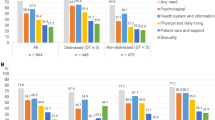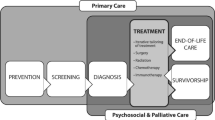Abstract
Purpose
The Institute of Medicine recommends that cancer patients receive survivorship care plans (SCP) summarizing information important to the individual’s long-term care. The various components of SCPs have varying levels of evidence supporting their impact. We surveyed medical oncologists to better understand how they perceived the relative value of different SCP components.
Methods
Medical oncologists caring for patients in diverse US practice settings were surveyed (357 respondents; participation rate 52.9%) about their perceptions of the usefulness of various components of SCPs to both patients and primary care physicians (PCPs).
Results
Oncologists perceived treatment summaries as “very useful” for PCPs but were less likely to perceive them as “very useful” for patients (55% vs. 40%, p < 0.001). Information about the psychological effects of cancer (41% vs. 29%; p < 0.001) and healthy behaviors (67% vs. 41%; p < 0.001) were considered more useful to patients than to PCPs. From 3 to 20% of oncologists believed that any given component of the SCP was not useful to either PCPs or patients. Oncologists who perceived SCPs to be more useful tended to be female or to practice in settings with a fully implemented electronic health record.
Conclusions
Oncologists do not perceive all components of SCPs to be equally useful to both patients and PCPs. To be successfully implemented, the SCP should be efficiently tailored to the unique needs and knowledge of patients and their PCPs. A minority of oncologists appear to be late adopters, suggesting that some resistance to the adoption of SCPs remains.

Similar content being viewed by others
References
Institute of Medicine (2006) In: Hewitt MGS, Stovall E (eds) From cancer patient to cancer survivor: lost in transition. National Academies Press, Washington, DC
Emery JD, Jefford M, King M, Hayne D, Martin A, Doorey J, Hyatt A, Habgood E, Lim T, Hawks C, Pirotta M, Trevena L, Schofield P (2017) ProCare trial: a phase II randomized controlled trial of shared care for follow-up of men with prostate cancer. BJU Int 119:381–389
Hudson MM, Leisenring W, Stratton KK, Tinner N, Steen BD, Ogg S, Barnes L, Oeffinger KC, Robison LL, Cox CL (2014) Increasing cardiomyopathy screening in at-risk adult survivors of pediatric malignancies: a randomized controlled trial. J Clin Oncol Off J Am Soc Clin Oncol 32:3974–3981
Boekhout AH, Maunsell E, Pond GR et al (2015) A survivorship care plan for breast cancer survivors: extended results of a randomized clinical trial. J Cancer Surviv 9:683–691
Greenlee H, Molmenti CL, Crew KD, Awad D, Kalinsky K, Brafman L, Fuentes D, Shi Z, Tsai WY, Neugut AI, Hershman DL (2016) Survivorship care plans and adherence to lifestyle recommendations among breast cancer survivors. J Cancer Surviv 10(6):956–963. https://doi.org/10.1007/s11764-016-0541-8
Grunfeld E, Julian JA, Pond G, Maunsell E, Coyle D, Folkes A, Joy AA, Provencher L, Rayson D, Rheaume DE, Porter GA, Paszat LF, Pritchard KI, Robidoux A, Smith S, Sussman J, Dent S, Sisler J, Wiernikowski J, Levine MN (2011) Evaluating survivorship care plans: results of a randomized, clinical trial of patients with breast cancer. J Clin Oncol 29(36):4755–4762. https://doi.org/10.1200/JCO.2011.36.8373
Hershman DL, Greenlee H, Awad D, Kalinsky K, Maurer M, Kranwinkel G, Brafman L, Jayasena R, Tsai WY, Neugut AI, Crew KD (2013) Randomized controlled trial of a clinic-based survivorship intervention following adjuvant therapy in breast cancer survivors. Breast Cancer Res Treat 138(3):795–806. https://doi.org/10.1007/s10549-013-2486-1
Salz T, Baxi S (2016) Moving survivorship care plans forward: focus on care coordination. Cancer Med 5(7):1717–1722. https://doi.org/10.1002/cam4.733
Birken SA, Presseau J, Ellis SD, Gerstel AA, Mayer DK (2014) Potential determinants of health-care professionals’ use of survivorship care plans: a qualitative study using the theoretical domains framework. Implement Sci 9:167. Published 2014 Nov 15. https://doi.org/10.1186/s13012-014-0167-z
Forsythe LP, Parry C, Alfano CM, Kent EE, Leach CR, Haggstrom DA, Ganz PA, Aziz N, Rowland JH (2013) Use of survivorship care plans in the United States: associations with survivorship care. J Natl Cancer Inst 105(20):1579–1587. https://doi.org/10.1093/jnci/djt258
Klabunde CN, Han PK, Earle CC, Smith T, Ayanian JZ, Lee R, Ambs A, Rowland JH, Potosky AL (2013) Physician roles in the cancer-related follow-up care of cancer survivors. Fam Med 45(7):463–474
Blanch-Hartigan D, Forsythe LP, Alfano CM, Smith T, Nekhlyudov L, Ganz PA, Rowland JH (2014) Provision and discussion of survivorship care plans among cancer survivors: results of a nationally representative survey of oncologists and primary care physicians. J Clin Oncol 32:1578–1585
Malin JL, Ko C, Ayanian JZ, Harrington D, Nerenz DR, Kahn KL, Ganther-Urmie J, Catalano PJ, Zaslavsky AM, Wallace RB, Guadagnoli E, Arora NK, Roudier MD, Ganz PA (2006) Understanding cancer patients’ experience and outcomes: development and pilot study of the cancer care outcomes research and surveillance patient survey. Support Care Cancer 14(8):837–848. https://doi.org/10.1007/s00520-005-0902-8
Kehl KL, Landrum MB, Kahn KL, Gray SW, Chen AB, Keating NL (2015) Tumor board participation among physicians caring for patients with lung or colorectal cancer. J Oncol Pract 11(3):e267–e278. https://doi.org/10.1200/JOP.2015.003673
Little RJ, Rubin DB Statistical analysis with missing data. Wiley, New York
Denzen EM, Preussler JM, Murphy EA, Baker KS, Burns LJ, Foster J, Idossa L, Moore HK, Payton TJ, Haven D, Jahagirdar B, Kamani N, Rizzo JD, Salazar L, Schatz BA, Syrjala KL, Wingard JR, Majhail NS (2019) Tailoring a survivorship care plan: patient and provider preferences for recipients of hematopoietic cell transplantation. Biol Blood Marrow Transplant 25(3):562–569. https://doi.org/10.1016/j.bbmt.2018.10.005
Nekhlyudov L, Schnipper JL (2012) Cancer survivorship care plans: what can be learned from hospital discharge summaries? J Oncol Pract 8(1):24–29. https://doi.org/10.1200/JOP.2011.000273
Noar SM, Benac CN, Harris MS (2007) Does tailoring matter? Meta-analytic review of tailored print health behavior change interventions. Psychol Bull 133(4):673–693. https://doi.org/10.1037/0033-2909.133.4.673
Conway N, Webster C, Smith B, Wake D (2017) eHealth and the use of individually tailored information: a systematic review. Health Informatics J 23(3):218–233. https://doi.org/10.1177/1460458216641479
Cheung WY, Neville BA, Cameron DB, Cook EF, Earle CC (2009) Comparisons of patient and physician expectations for cancer survivorship care. J Clin Oncol 27(15):2489–2495. https://doi.org/10.1200/JCO.2008.20.3232
Antalis EP, Doucette R, Kuhn G, Baker LH, Reinke D (2019) Patient perceptions of survivorship care plans: a mixed-methods evaluation. Oncol Nurs Forum 46(4):493–502. https://doi.org/10.1188/19.ONF.493-502
Collie K, McCormick J, Waller A, Railton C, Shirt L, Chobanuk J, Taylor A, Lau H, Hao D, Walley B, Kapusta B, Joy AA, Carlson LE, Giese-Davis J (2014) Qualitative evaluation of care plans for Canadian breast and head-and-neck cancer survivors. Curr Oncol 21(1):e18–e28. https://doi.org/10.3747/co.21.1698
Reason J (1990) Human error. University Press, Cambridge
Haggstrom DA, Arora NK, Helft P, Clayman ML, Oakley-Girvan I (2009) Follow-up care delivery among colorectal cancer survivors most often seen by primary and subspecialty care physicians. J Gen Intern Med 24(Suppl 2):S472–S479. https://doi.org/10.1007/s11606-009-1017-6
Earle CC, Neville BA (2004) Under use of necessary care among cancer survivors. Cancer 101(8):1712–1719. https://doi.org/10.1002/cncr.20560
Zhao G, Okoro CA, Li J, White A, Dhingra S, Li C (2014) Current depression among adult cancer survivors: findings from the 2010 behavioral risk factor surveillance system. Cancer Epidemiol 38(6):757–764. https://doi.org/10.1016/j.canep.2014.10.002
Mowls DS, Brame LS, Martinez SA, Beebe LA (2016) Lifestyle behaviors among US cancer survivors. J Cancer Surviv 10(4):692–698. https://doi.org/10.1007/s11764-016-0515-x
Richards D, Richardson T (2012) Computer-based psychological treatments for depression: a systematic review and meta-analysis. Clin Psychol Rev 32(4):329–342. https://doi.org/10.1016/j.cpr.2012.02.004
Nordgren LB, Hedman E, Etienne J, Bodin J, Kadowaki A, Eriksson S, Lindkvist E, Andersson G, Carlbring P (2014) Effectiveness and cost-effectiveness of individually tailored Internet-delivered cognitive behavior therapy for anxiety disorders in a primary care population: a randomized controlled trial. Behav Res Ther 59:1–11. https://doi.org/10.1016/j.brat.2014.05.007
King AC, Hekler EB, Grieco LA, Winter SJ, Sheats JL, Buman MP, Banerjee B, Robinson TN, Cirimele J (2016) Effects of three motivationally targeted mobile device applications on initial physical activity and sedentary behavior change in midlife and older adults: a randomized trial. PLoS One 11(6):e0156370. https://doi.org/10.1371/journal.pone.0156370
Spring B, Schneider K, McFadden HG, Vaughn J, Kozak AT, Smith M, Moller AC, Epstein LH, Demott A, Hedeker D, Siddique J, Lloyd-Jones DM (2012) Multiple behavior changes in diet and activity: a randomized controlled trial using mobile technology. Arch Intern Med 172(10):789–796. https://doi.org/10.1001/archinternmed.2012.1044
Walker J, Leveille SG, Ngo L, Vodicka E, Darer JD, Dhanireddy S, Elmore JG, Feldman HJ, Lichtenfeld MJ, Oster N, Ralston JD, Ross SE, Delbanco T (2011) Inviting patients to read their doctors' notes: patients and doctors look ahead: patient and physician surveys. Ann Intern Med 155(12):811–819. https://doi.org/10.7326/0003-4819-155-12-201112200-00003
Miller DP Jr, Latulipe C, Melius KA, Quandt SA, Arcury TA (2016) Primary care providers’ views of patient portals: interview study of perceived benefits and consequences. J Med Internet Res 18(1):e8. https://doi.org/10.2196/jmir.4953
Bell SK, Mejilla R, Anselmo M, Darer JD, Elmore JG, Leveille S, Ngo L, Ralston JD, Delbanco T, Walker J (2017) When doctors share visit notes with patients: a study of patient and doctor perceptions of documentation errors, safety opportunities and the patient-doctor relationship. BMJ Qual Saf 26(4):262–270. https://doi.org/10.1136/bmjqs-2015-004697
Hall DE, Prochazka AV, Fink AS (2012) Informed consent for clinical treatment. CMAJ. 184(5):533–540. https://doi.org/10.1503/cmaj.112120
Sima JL, Perkins SM, Haggstrom DA (2014) Primary care physician perceptions of adult survivors of childhood cancer. J Pediatr Hematol Oncol 36(2):118–124. https://doi.org/10.1097/MPH.0000000000000061
Ferrell BR, Winn R (2006) Medical and nursing education and training opportunities to improve survivorship care. J Clin Oncol 24(32):5142–5148. https://doi.org/10.1200/JCO.2006.06.0970
CMS oncology care model names NCCN guidelines as high-quality care and evidence-based recommendations (2015). J Natl Compr Cancer Netw 13(3)
Rogers EM (1995) Diffusion of innovations. 4th edn. Free Press, New York
Berwick DM (2003) Disseminating innovations in health care. JAMA 289(15):1969–1975. https://doi.org/10.1001/jama.289.15.1969
Bertakis KD (2009) The influence of gender on the doctor-patient interaction. Patient Educ Couns 76(3):356–360. https://doi.org/10.1016/j.pec.2009.07.022
Funding
The work of the CanCORS Consortium was supported by grants from the NCI to the Statistical Coordinating Center (U01 CA093344) and the NCI-supported Primary Data Collection and Research Centers (Dana-Farber Cancer Institute/Cancer Research Network U01 CA093332, Harvard Medical School/Northern California Cancer Center U01 CA093324, RAND/UCLA U01 CA093348, University of Alabama at Birmingham U01 CA093329, University of Iowa U01 CA093339, University of North Carolina U01 CA093326) and by a Department of Veterans Affairs grant to the Durham VA Medical Center CRS 02-164.
Author information
Authors and Affiliations
Corresponding author
Ethics declarations
All procedures performed in studies involving human participants were in accordance with the ethical standards of the institutional and/or national research committee and with the 1964 Helsinki declaration and its later amendments or comparable ethical standards.
Conflict of interest
The authors declare that they have no conflict of interest.
Additional information
Publisher’s note
Springer Nature remains neutral with regard to jurisdictional claims in published maps and institutional affiliations.
Electronic supplementary material
ESM 1
(DOCX 12 kb)
Rights and permissions
About this article
Cite this article
Haggstrom, D.A., Kahn, K.L., Klabunde, C.N. et al. Oncologists’ perceptions of the usefulness of cancer survivorship care plan components. Support Care Cancer 29, 945–954 (2021). https://doi.org/10.1007/s00520-020-05531-9
Received:
Accepted:
Published:
Issue Date:
DOI: https://doi.org/10.1007/s00520-020-05531-9




